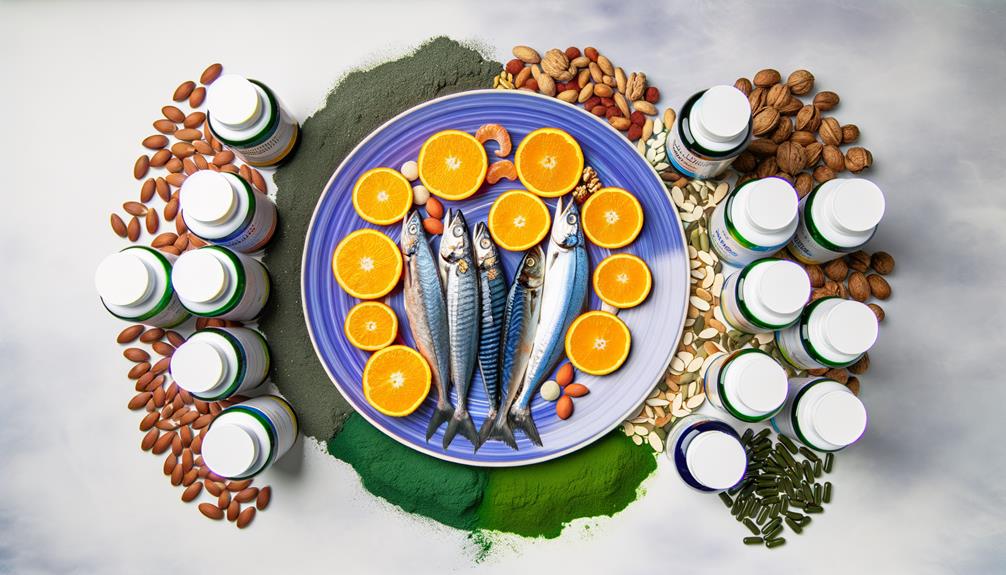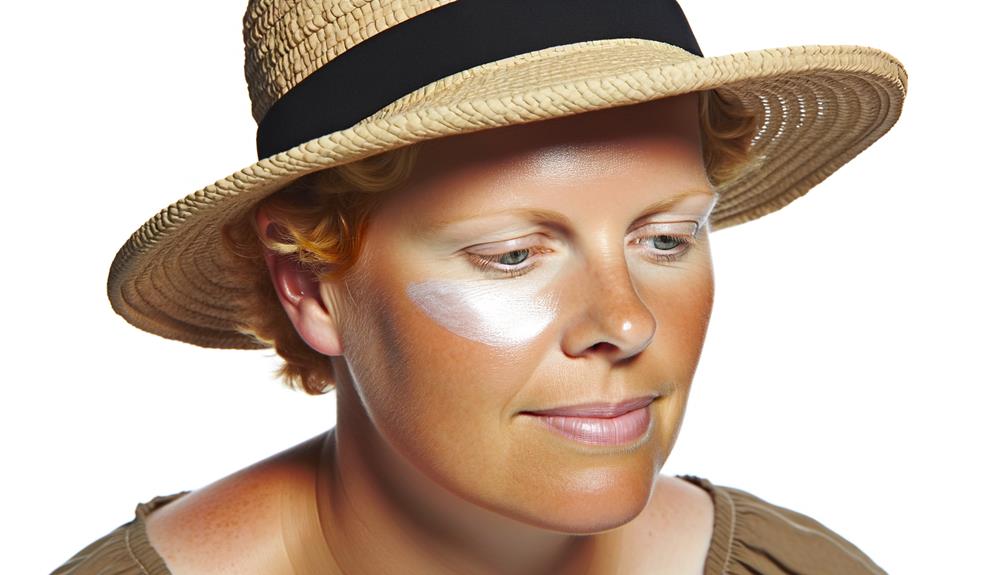
Understanding the intricacies of melanin production holds a key to achieving a naturally radiant complexion.
Melanin, the pigment responsible for skin coloration, is a crucial element in protecting the skin from the damaging effects of UV radiation.
As we embark on this exploration, we will uncover safe and effective methods for enhancing melanin production, shedding light on the significance of sun exposure, skincare routines, dietary considerations, and potential supplemental interventions.
By delving into these strategies, we aim to provide a comprehensive understanding that empowers individuals to make informed choices in their pursuit of a healthier and more vibrant skin tone.
Join us on this journey as we unravel the secrets to boosting melanin production and achieving a luminous complexion.
Key Takeaways
- Safe sun exposure and sunscreen usage are essential to protect your skin from damage and prevent sunburns.
- Hydration and proper skincare can contribute to healthier skin and enhance melanin production.
- A balanced diet rich in vitamins and minerals, especially those that support melanin production, can help boost your body's natural melanin levels.
- Consult with a dermatologist or healthcare professional for personalized advice and recommendations on treatments, supplements, and other methods to increase melanin production.
Safe Sun Exposure and Sunscreen

Safe sun exposure and sunscreen usage are essential for protecting the skin from harmful UV radiation and promoting a healthy tanning process. When aiming to increase melanin production, understanding the right approach to sun exposure is crucial.
Start by applying sunscreen with a minimum SPF of 15 before heading outdoors. This shields the skin from burning while still allowing the UV rays to stimulate melanin production. Limit your sun exposure to around 1 hour per day, ensuring you don't get sunburned, as this halts melanin production. Remember, melanin production is a response to skin cell damage, so avoiding sunburns is key.
Additionally, consider using self-tanning lotions or spray tans as a safer alternative to UV exposure. Gradual sun exposure paired with sunscreen is the best way to achieve a healthy tan and stimulate melanin production.
Be mindful of the risks associated with excessive sun exposure and prioritize the health of your skin while working to boost melanin levels.
Hydration and Skincare
Maintaining adequate hydration and implementing a consistent skincare regimen are essential factors in promoting a healthy and balanced approach to increasing melanin production.
3 Essential Tips for Hydration and Skincare:
- Drink Plenty of Water: Hydrated skin is healthier and more capable of producing melanin. Aim to drink at least 8 glasses of water daily and limit the intake of dehydrating substances such as caffeine and alcohol.
- Use Moisturizers and Hydrating Skincare Products: Nourish your skin with moisturizers and hydrating products to maintain its health and promote melanin production. Look for products with ingredients like hyaluronic acid, glycerin, and ceramides to lock in moisture and support skin health.
- Protect Your Skin from UV Radiation: While sunlight is essential for melanin production, it's crucial to protect your skin from harmful UV rays. Apply sunscreen with a minimum SPF of 15, and reapply it every 2 hours when exposed to the sun. Additionally, consider wearing protective clothing and seeking shade during peak sun hours to safeguard your skin while promoting melanin production.
Nutrition and Supplements

Promoting melanin production through proper hydration and skincare lays the foundation for our exploration of the vital role that nutrition and supplements play in achieving balanced and healthy skin pigmentation. Consuming foods high in melanin and vitamins is essential for increasing melanin production. Incorporate foods such as carrots, sweet potatoes, spinach, and citrus fruits into your diet, as they are known to support melanin production.
Additionally, foods rich in beta-carotene and Vitamin A, like carrots, tomatoes, and sweet potatoes, can enhance skin color, especially for lighter skin tones. Dark green vegetables such as broccoli and spinach also contain beta-carotene.
Moreover, incorporating foods rich in Vitamins C and E, such as citrus fruits and nuts, can further support melanin production and protect the skin. It's also important to consider vitamin supplements for Vitamins A, C, D, or E, as they can contribute to healthy skin pigmentation. However, it's crucial to consult with a healthcare professional before starting any new supplement regimen to ensure safety and effectiveness in increasing melanin production.
Other Methods to Increase Melanin
In addition to dietary and skincare approaches, various other methods can be considered to enhance melanin production and achieve desired skin pigmentation.
- Undergo treatments like light therapy or laser treatments to stimulate melanin production.
- Take supplements like L-tyrosine and copper to support melanin production.
- Incorporate vitamin-rich foods into your diet.
When it comes to increasing melanin, treatments like light therapy or laser treatments can effectively stimulate melanin production, leading to a natural darkening of the skin.
Additionally, supplements containing L-tyrosine and copper can support the production of melanin, aiding in achieving the desired skin pigmentation.
Furthermore, incorporating vitamin-rich foods into your diet can provide essential nutrients that support melanin production.
Risks and Precautions

It is important to consider the potential risks and take necessary precautions when exploring methods to increase melanin production. While there are various methods to stimulate melanocytes and enhance melanin production, it's essential to be mindful of the associated risks.
When considering melanin supplements or natural melanin-boosting foods, it's crucial to consult with a healthcare professional to ensure safety and effectiveness. Additionally, taking melanin pills for skin or vitamins to boost melanin should be approached with caution, and it's important to follow recommended dosages to avoid adverse effects.
One significant risk to be aware of is the use of unregulated tanning pills containing high levels of canthaxanthin, as they may cause retina damage and are not FDA approved.
It's also essential to note that excessive exposure to UV radiation, whether from natural sunlight or tanning beds, can lead to sunburn, skin damage, and an increased risk of skin cancer. Therefore, it's vital to use sunscreen with a minimum SPF of 15, limit sun exposure, and avoid tanning beds.
Frequently Asked Questions
Can Stress or Lack of Sleep Affect Melanin Production?
Stress and lack of sleep can impact melanin production. Chronic stress can stimulate the release of cortisol, which may inhibit melanin synthesis. Sleep deprivation can disrupt hormonal balance, potentially affecting melanin production. Managing stress and prioritizing rest are crucial for skin health.
Are There Any Natural Remedies or DIY Methods to Boost Melanin Production?
Natural remedies to boost melanin production include safe sun exposure, hydration, a diet rich in vitamins and minerals, and topical treatments. Professional advice from a dermatologist is crucial to ensure safety and effectiveness.
How Does Age Affect Melanin Production and Skin Tanning?
Age affects melanin production and skin tanning. As we age, melanin production decreases, leading to lighter skin and reduced ability to tan. Aging skin is also more prone to sun damage, emphasizing the importance of safe sun exposure and skincare.
Can Certain Medications or Medical Conditions Impact Melanin Production?
Certain medications or medical conditions can impact melanin production. Medications like corticosteroids or antipsychotics may affect melanin levels. Medical conditions such as vitiligo can decrease melanin production, while Addison's disease can increase it.
Are There Any Specific Exercises or Activities That Can Help Stimulate Melanin Production in the Body?
Engaging in physical activities and exercises does not directly stimulate melanin production. However, maintaining overall health through a balanced diet, hydration, and sun protection can support skin health and natural melanin production.




